Now this is how you do a romantic comedy! Known best for his work as an Emy nominated producer and director in television, writer/director JESSE PERETZ has also had success with film, most notably with “Our Idiot Brother”. But now he tackles romantic comedy with a freshness and light touch that harkens to comedies of Preston Sturges, filled with real heart, honest laughs, and real characters. Calling on the talents of Ethan Hawke, Rose Byrne, and Chris O’Dowd in front of the camera, Peretz together with his co-scribe sister Evgenia Peretz, as well as the work of writers Jim Taylor and Tamara Jenkins, brings the Nick Hornby novel to life on the big screen. And when I say, “to life”, I mean “life”!
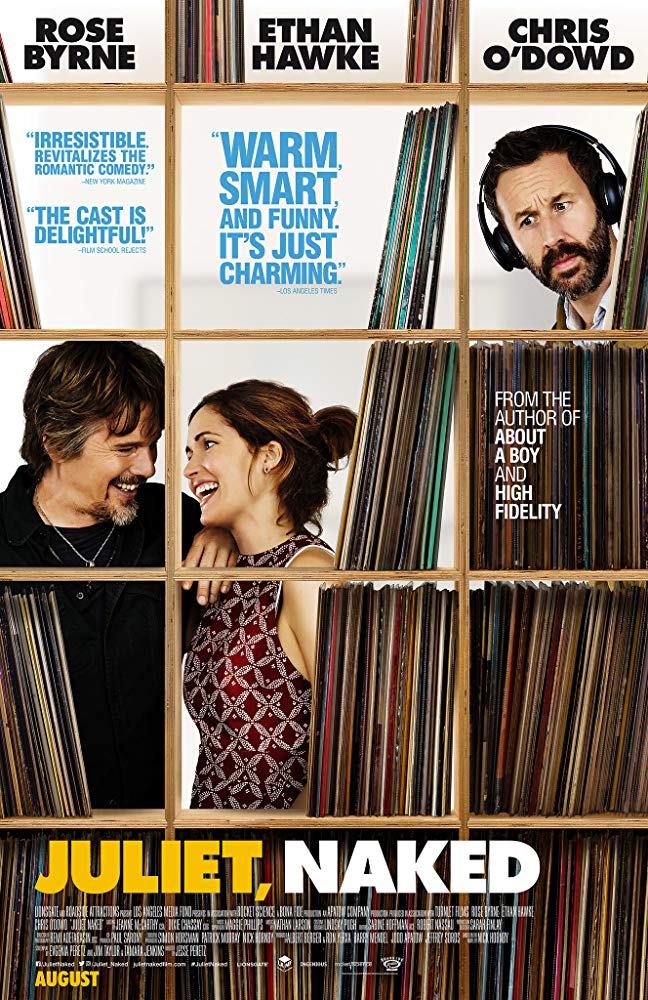
As former recording artist and perceived one-hit album-wonder Tucker Crowe, Ethan Hawke delivers yet another winning performance. (Hawke is only getting better with age.) With Tucker as the object of his obsession, Chris O’Dowd’s Duncan is more than a superfan, devoting his entire existence to the study of Tucker and most importantly, his last acoustic album JULIET, NAKED, which has somehow found its way into Duncan’s over-eager hands. Long believed dead by many, this album is revelatory and a sure sign that Tucker is very much alive and well. But where? Unfortunately for Duncan, his long-suffering girlfriend, cultural anthropologist and local museum curator Annie, is getting tired of Duncan’s love of all things Tucker, particularly with the appearance of JULIET, NAKED. Combating Duncan’s Tucker love, Annie listens to the album but rips it to shreds on Duncan’s very own Tucker Crowe fan site. Amazingly, one person agrees with her and reaches out to her in camaraderie; Tucker Crowe himself, a man who is flawed and failing and in hiding as if ashamed of a life he took for granted.
With all the charm of “Shop Around the Corner” or “You’ve Got Mail”, Annie and Tucker strike up an online and texting friendship that soon finds Tucker crossing the pond and arriving at Annie’s front door with the foibles, fiascos and fallacies of the baggage of Tucker’s life coming along for the ride. Will a romance ensue? Can their online friendship withstand one IRL? And what of Duncan? But above all, what about Tucker? Between the chemistry between Hawke and Byrne, and Hawke’s masked vulnerability and beautiful singing voice (yes, Ethan Hawke sings in the film and all tracks are of him), JULIET, NAKED has an emotional richness and pure joy to warm the heart of the biggest cynic. From script to screen, from the word on the page to the visual construct and tonal bandwidth, JESSE PERETZ fills a cinematic void with JULIET, NAKED.
I had a chance to speak with Jesse at length in this exclusive interview where he bares all about JULIET, NAKED. . .
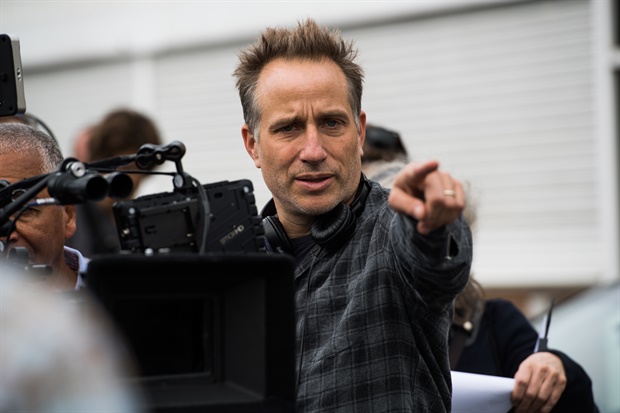
I am so in love with this film, Jesse! It is one of my feel-good films of the year. Definitely the feel-good film of the summer. You really bring back a romantic comedy in the truest sense of what romance and light comedy are. Really well done.
Thank you so much. I’m excited that it’s coming out, hoping that people will see it in this dark age of trying to get people to see movies. Although, I guess because I’m a symptom of the problem, because I’m definitely spending more of my life working on TV, so I guess, on some level, I’m part of the problem of the TV generation that we’re in. But, yeah, it was a fun movie to do, but also it was a bit of a trickier novel to adapt and sort of figure out the film version of it than it was on sort of face value when first reading the novel, you know? But I’m glad that you’re connecting with it.
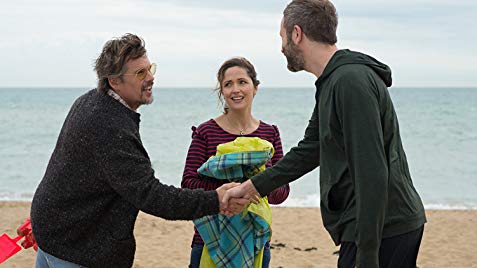
What posed the greatest challenge for you as a director with this adaptation of Nick’s book?
Well, I think, for me, the biggest challenge was we’re driving the story … Even though he [Tucker Crowe] doesn’t enter the movie until a quarter of the way in, and even then it’s only in the form of voiceover, Tucker Crowe is the object at the center of this crumbling relationship. Obviously, we wanted to try to land this movie in a sense of wanting Annie and Tucker to at least seem like they have the potential to end up together, but Tucker is such an inherently flawed character, and has such a terrible sort of history and track record, and little to no potential as a boyfriend, lover, whatever you want to call it, that trying to figure out how to keep that character sort of true to his rascally bad ways, and still be able to get the movie to the place where, on some level, you as an audience are still rooting for Annie, who’s a truly good person, to potentially take a swing at being with him, involves some sort of complicated finessing, you know? And I think that was, I think, one of the major things that we really had to kind of nuance to figure out how to get him there, and not sort of whitewash the ways in which he’s a flawed, kind of selfish person, who’s really let a lot of people down, and at the same time, make him redemptive and positive enough that ultimately the audience would be happy thinking that maybe she would try to do something with him, you know?
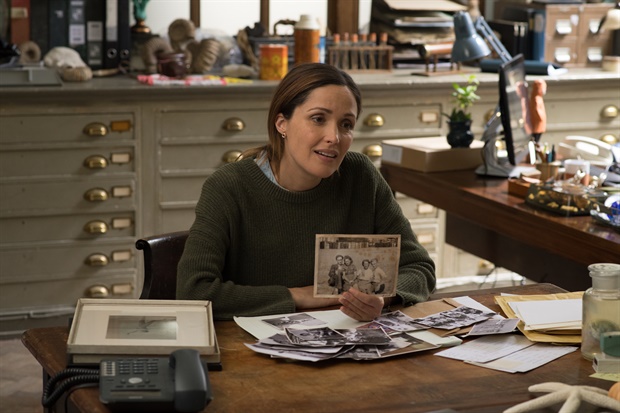
So much of that is key to pulling that off is casting Ethan Hawke. He is the perfect rock ‘n roll bad boy who isn’t totally bad, but it’s those rascally ways that you mention that Tucker has that makes having multiple ex-wives, multiple kids you can’t even keep count … It makes it all very believable. And it’s his charm that really helps root him.
It’s really funny because we were definitely setting this movie up at the development stage of imagining an actor eight to ten years older than Ethan. Even though, somewhere in my head, Ethan was always the perfect prototype. But I swear, the amount of times I said, “Someone like Ethan Hawke, but eight or ten years older.” – and because in the novel the character is definitely a bit older than Annie than Ethan is – but when he expressed an interest in it and we had our first meeting, it just became so clear to me that he was the guy meant to play that part. There was no one else that I was going to be as happy with. It was one of those things, too, where, especially in developing a novel, but even sometimes just letting go of an idea, there’s so many things that you lock onto that feel like, “Oh, this is part of the original concept of it. You can’t change it.” But then you think for a second, wait a minute, is this story really about him being that much older than her? And the one thing I will say, too, is that Ethan is not only a great actor, but he’s also a writer and director, and he really cares so much about what he does in a way that he really maintains a kind of purity of loving storytelling. In a way, my sister and I, in doing our final drafts of the script, had sort of almost cleaned him up too much, and I really credit him for when he arrived in London two weeks before we started shooting – it wasn’t even two weeks. It was a little less than that and we had sort of planned that we would spend a couple days rehearsing/working on the script – but he really came in with a point of view of “Let’s try to dig into the more rascally side of this character,” and showed us that he could play a more flawed version of the character and that people would still like him. And he was so helpful in sort of crafting who that character really ended up being, you know?
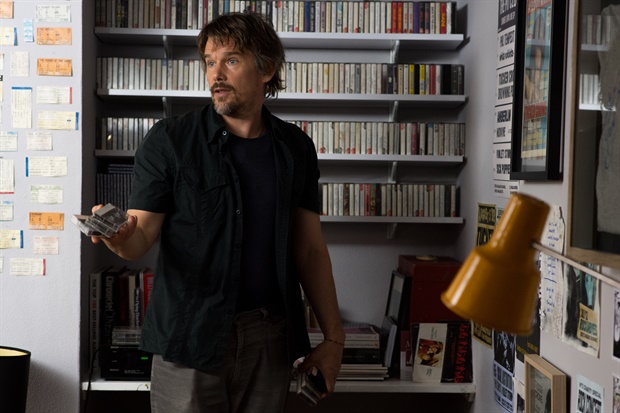
What’s so beautiful about Ethan’s performance is that we really do see this beautiful arc because of Annie’s influence on him. And you really see how perfectly suited these two can be for each other. And that just really ramps up the heart-smiling, feel-good aspect of the film. And then you get Ethan singing, and “Waterloo Sunset”! An absolutely gorgeous moment in the film with him singing.
Thank you. No, I really agree. He’s got a pretty damn good voice, I’ve got to say.
He does! I want a soundtrack. I want a soundtrack of Ethan singing all those songs.
The soundtrack is coming out the same week as the movie. There will be CDs. It will also be on Spotify and Apple Music I think the 15th or 16th of August. So it will be there for you.
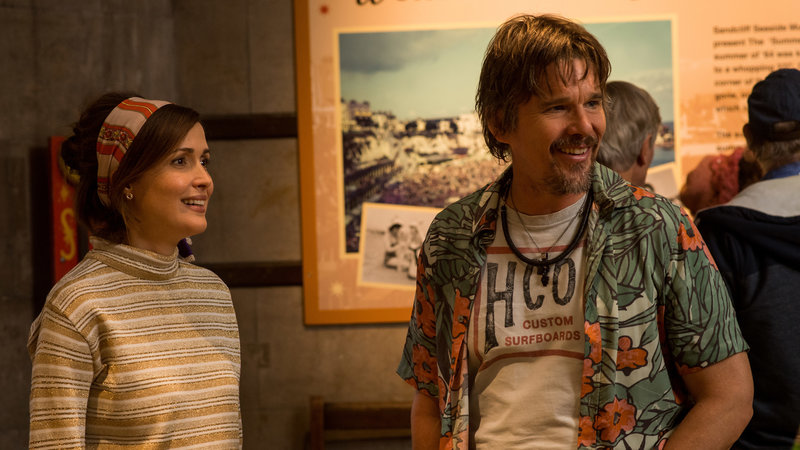
I just really love the music that you and Nathan Larson and Maggie Phillips have selected and written for this film. Music is so key in your life and in the films that you’ve done. I know your music video background and I know you have a real handle on the performance of pieces both vocally and visually. So I’m curious what you and Nathan and Maggie went through with the musical portion of this film, because if we don’t believe the musical portion about Tucker’s life, that destroys Duncan’s character, and it really doesn’t give us the backbone to support the bad boy musician.
Yeah, and the level of obsession. Yeah. I guess I simplify it by saying there’s a handful of really hard moments in the development of this movie, and I do think creating the music of Tucker Crowe was this very heavy thing weighing over us. To be perfectly honest, there wasn’t a complete consensus with all of my producers exactly what the music should be. To me, it was really important that I wanted his music to be good enough and smart enough that an audience could understand why Duncan was obsessed, but it also couldn’t be too hooky, and too poppy, or you wouldn’t believe. He needed to be an obscure figure for someone like Duncan who’s so ultimately pretentious, to be dedicating his life to an unsung sort of unknown artist. If he had been super popular, or it had been super accessible music, someone like Duncan never would’ve given his life to it. So that was sort of the mandate. All three of us talked about prototypes of what we thought the music would be like. Judd Apatow [producer] challenged us.
I was going to have Nathan just write a lot of songs, but Judd Apatow challenged us to go out there and try to get people to write songs for this character, and I thought, “Oh, this is going to be so hard to do”, but we got so many submissions. It was really hard because we had such a specific idea of what we wanted it to be. There were a lot of beautiful songs written for us but it wasn’t right for the character or they didn’t hold together with the other songs. But ultimately, we got six or seven. Nathan wrote a couple, but we got six or seven songs that sort of became the Tucker Crowe music, and then Nathan put together a bit of a band, and he and Ethan had a recording session right after Christmas last year that was just incredibly fruitful, and sort of became the backbone of the two records. The demo version of the record, but also in a lot of ways, a lot of the score came out of those songs. In the end, it was really scary because it definitely felt for a while that we didn’t have what we needed to really make it work, and there wass a lot of hand-wringing of were we going the right direction, but suddenly this session happened, and literally, days before we needed to pop the music into the movie for our Sundance premiere. So I was happy. I was very happy those sessions worked out as well as they did.
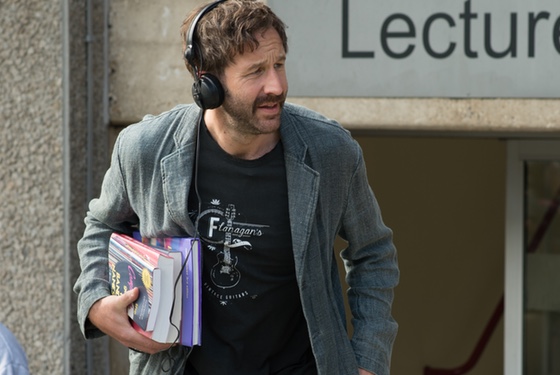
Because Nick’s material is so beautiful, I’m wondering what was it about this that drew you back to the big screen after doing so much television; doing “Girls”, doing “Nurse Jackie”, doing a few one-offs. Now you’re doing “Glow”. So I’m curious what drew you back to this big screen piece?
I think, if anything, for almost any director who’s spending a lot of time working in TV, still we almost all want to keep making movies. I will say one of the things I love about working on TV besides the fact that it’s a much better way to be able to support a family with three kids, but for me, my favorite part of directing is actually being on set directing, so the nice thing about TV is you do spend, as a director, a majority of your working time actually directing, where making a movie, the vast majority is developing the project and trying to get it made. And then the shooting. This was 32 days, but those 32 days you’re shooting go by so quickly, and you never feel like you had quite as much as you wanted. And then you’re in the editing room for another four or five months. I guess all I’m trying to say is I’m always going to want to keep making movies.
This was a project that was in development. It had four great producers, Albert Berger, Ron Yerxa, and Judd Apatow, and Barry Mendel. They came to me with this project where they had been developing the script with Tamara Jenkins and Jim Taylor, and I really loved the novel. For me, my entry into it of the thing that I was most enthusiastic about trying to explore was really the idea of Tucker Crowe as this guy. He’s let his life come to a grinding halt because of the self-loathing of being a failure as a parent. I loved what’s inherent in it is obviously the elements of fan worship, but I think to me, more importantly, the element of how fraudulent artists can feel, how art can feel, in the face of insane, over the top fandom. And so those are sort of the elements that drew me into the story, and in a way, I had these sort of touchstones which I could really identify with elements of both Tucker Crowe, especially his past, and elements of Duncan. In a period of my life, I was an insane music collector, and music obsessive. Obviously, I grew out of it more than Duncan did. But then also, I just loved the character of Annie, and the challenge of her being this sort of quieter character in the face of these more obvious, big, male characters. And I guess I would say another one of the big challenges was this movie was really always centered on her, and her journey, and it was how to make her character pop out even in the context of her being the sort of quieter, sort of least aggressive person of these three in terms of needing to be heard. How to really give her journey the satisfaction of someone finding themselves, and finding a second chance for themselves, and doing it in such a way that also wasn’t all wrapped up in it being for a man, but being really about doing something for herself, you know?
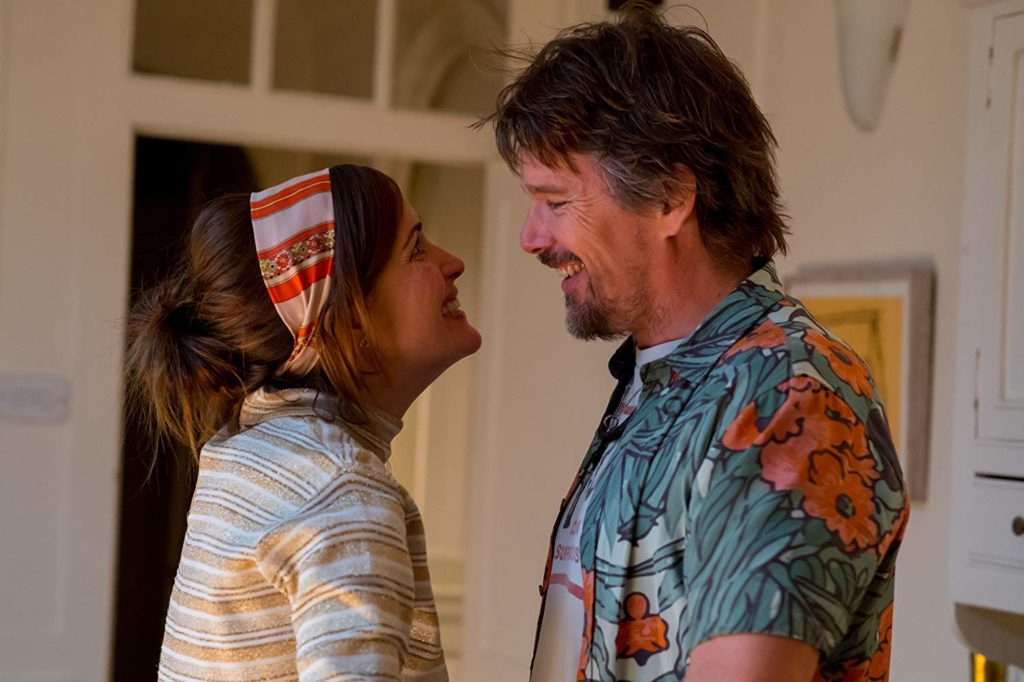
Before I let you go, Jesse, I want to ask you about the beautiful marriage between Remi’s [Adefarasin] cinematography and Sarah Finlay’s production design. This film is gorgeous to look at. It makes you happy looking at it. I love what you’ve done with the metaphoric contrasts that you have within Annie’s house; that corner house, very claustrophobic rooms, but it never feels claustrophobic. It feels like it’s enveloping her like a warm blanket as opposed to so many situations where jammed, crammed interiors mirror the world is closing in. She’s very comfortable in her little cocoon and it suits her, and your imagery reflects that. But then, as she gets exposed to Tucker, we start to see the camera go wide. There’s more taking place outdoors, and you get some beautiful seaside stuff. So I’d love to hear your thoughts on working with Remi and Sarah in creating that visual tonal bandwidth.
Well, thank you so much. One of the sort of key conversations that the three of us had was how to sort of thread the needle. At the center of the story is this character, Annie, who has been stuck in this town more or less her whole life, and the town is as much holding her back as anything else in her life. We really were conscious about trying to figure out how to thread the needle of not trying to make this movie feel like where she lives is inherently a horrible, gray, depressing place. As much as I love Ken Loach, and I really do love almost every Ken Loach movie, I’m like the hugest fan of him, but I would say we were very conscious of we didn’t want this movie to feel depressing and gray like a Ken Loach movie. [We] wanted it to be really grounded in real life, but also wanted to feel like when we start the movie, it’s not like where she lives is horrible. It’s just that her situation of where she’s found herself is not letting her spread her wings and be the adult that she wants to be. And so we were definitely consciously working together, figuring out how to thread that needle, and have the cinematic pleasure that sucks a viewer in, and makes you want to be in the rooms with them, and be outside on the beach with them. But at the same time, feel that sort of grayer palette of Britain, and the elements that do feel like ultimately there is something else out there for her to get out from underneath this town.
That was really our focus. And they were such a great team for me. I went to England. This project came to me with four American producers. This movie that was almost entirely set in the UK. We shot everything including the American portions in the UK, and I felt in a way like my own version of Tucker Crowe, feeling like a fraud, feeling like here I am dealing with this Nick Hornby novel that takes place mostly in the UK, and there’s all these American producers, American director, writer. So the one decision I made was I wanted an entirely British crew. I didn’t bring anybody that I work with. So the entire crew from top to bottom on set crew were people I’d never worked with. And Sarah and Remi were a great team, but interestingly, Sarah’s kind of in the beginning of her production design career. But I just loved the movies that she’d done and I loved the concept that she came to me with. And then Remi has this long resume of work. The lighting is so beautiful, but ultimately it’s grounded in reality, and it doesn’t feel like he wants the cinematography to be the star. He really comes from the school that it is about the actors and the story, but they’re supported by his gorgeous, effortless lighting all over the place. They were a dream to work with, the two of them, and I look forward to working with them both again.
by debbie elias, interview 7/24/2018











